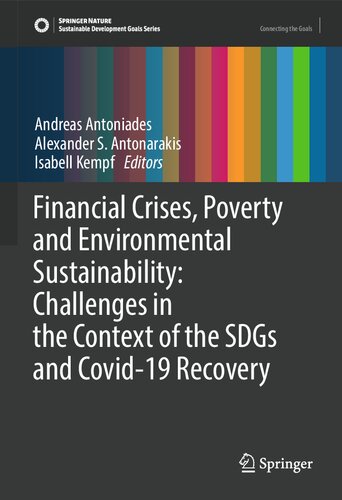

Most ebook files are in PDF format, so you can easily read them using various software such as Foxit Reader or directly on the Google Chrome browser.
Some ebook files are released by publishers in other formats such as .awz, .mobi, .epub, .fb2, etc. You may need to install specific software to read these formats on mobile/PC, such as Calibre.
Please read the tutorial at this link: https://ebookbell.com/faq
We offer FREE conversion to the popular formats you request; however, this may take some time. Therefore, right after payment, please email us, and we will try to provide the service as quickly as possible.
For some exceptional file formats or broken links (if any), please refrain from opening any disputes. Instead, email us first, and we will try to assist within a maximum of 6 hours.
EbookBell Team

5.0
98 reviewsThis volume advances the state-of-the-art in the study of the interplay among financial crises, poverty dynamics and environmental sustainability. It offers timely and unique contributions to the immediate global challenge of sustainable development. Developing a new evidence-base, the volume offers concrete recommendations for policy action needed in advancing the Sustainable Development Goals (SDGs) in relation to environment and poverty during the current conditions of financial distress. The approach taken is inductive and evidence-driven. Most analysis is based on in-depth case studies that aim to offer a detailed and dynamic picture on how poverty and environmental sustainability interact in specific social contexts and financial crises. In this way the volume aims to generate a wealth of new and concrete evidence that offer a solid foundation to understand the multiple channels through which social and environmental factors interact, and the ways in which this interaction can and should be managed in order to achieve the needed global transition to sustainability.
Broader dynamics that are covered and analysed include the historical legacies of structural adjustment and colonialism; the current debt wave experienced in developing countries; the role of inequality; the significant impact that climate change has on livelihoods and on meeting the SDGs; the new challenge presented by the Covid-19 pandemic for the SDGs; the challenge of sustainable funding for SDGs; and the need for a new eco-social contract. Case-studies examined include Cambodia, Ethiopia, India, Indonesia, Zambia, and subregions such as the Caribbean, sub-Saharan Africa and Lower Mekong Countries.
The volume is part of a joint initiative by the ‘Sussex Sustainability Research Programme (SSRP)’ of the University of Sussex, the ‘UNDP-UNEP Poverty-Environment Action for Sustainable Development Goals’ and the ‘United Nations Research Institute for Social Development (UNRISD)’. The overall aim is to advance a new research programme and foster a better understanding of the multiple, complex and often opposing ways through which the punctuated economic slowdown of financial crises, poverty dynamics and environmental sustainability interact. It also makes novel recommendations into how poverty reduction and environment can work in synergy rather than being antagonistic, especially during financial distress, leading into recommendations directly geared towards achieving the SDGs and beyond.